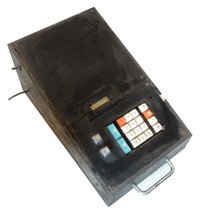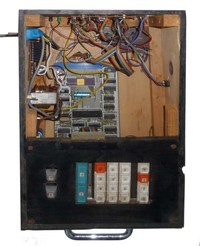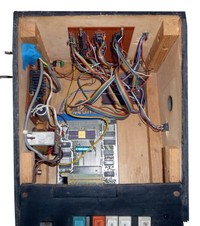Science of Cambridge MK14 + Memory Expansion in wooden case
| Home > Browse Our Collection > Computers > Sinclair > Science of Cambridge ... ansion in wooden case |
|
The Microcomputer Kit 14 (MK 14) was Sinclair's (at that time called "Science of Cambridge”) first computer. Based on the National Semiconductor SC/MP processor, the MK 14's capabilities were minimal by today's standards - modern digital watches are considerably more powerful! Despite the MK 14's severe limitations, it was one of the most important British computers ever produced. Its success in finding a previously untapped market was not lost on either Sinclair or his employees, notably Chris Curry, soon to break away and establish Acorn. Without the MK 14, there probably would never have been a ZX81, Spectrum, BBC Micro or Archimedes, and the British computer scene would have been very different. The MK 14 was a 31-piece computer kit sold by Science of Cambridge of the United Kingdom. It was first introduced in 1977 for UK£39.95 +VAT. The MK14 eventually sold over 50,000 units. It used a National Semiconductor SC/MP CPU (INS8060), 256 bytes of random access memory (RAM), which was directly expandable to 640 bytes on board and 2170 bytes total. It used an 8 or 9 red light-emitting diode (LED) seven segment display. There was also an optional VDU supporting 32×16 text or 64×64 graphics. Input and output was a 20-key keyboard and reset switch, with an optional 128 bytes of RAM and 16 I/O lines available by adding an INS8154N RAM/IO chip. Cassette-based and PROM storage were optional extras, a sound card was not included but a design for one was provided. The MK 14 Specification Hexadecimal keyboard
8-digit, 7-segment LED display
8 x 512 PROM, containing monitor program and interface instructions
256 bytes of RAM
4 MHz crystal
5 V regulator
Single 8 V power supply
Space available for extra 256-byte RAM and 16 port I/O
Edge connector access to all data lines and I/O ports
"This Science of Cambridge MK14 system - this very early kit boasted a 100KHz 4-bit SC/MP processor with 256 bytes of RAM. I put it in a case with a better keypad & display and slightly improved it - it was used for medical research in Oxford in the very late 1970s." This MK 14 was very generously donated by Tim Bergal. Manufacturer: Sinclair Comment on This Page Science of Cambridge MK14 + Memory Expansion in wooden case Manuals:
Science of Cambridge MK14 + Memory Expansion in wooden case Articles:
Magazines RELATED to Science of Cambridge MK14 + Memory Expansion in wooden case in our Library
Other Systems Related To Science of Cambridge MK14 + Memory Expansion in wooden case:This exhibit has a reference ID of CH28552. Please quote this reference ID in any communication with the Centre for Computing History. |
|
















